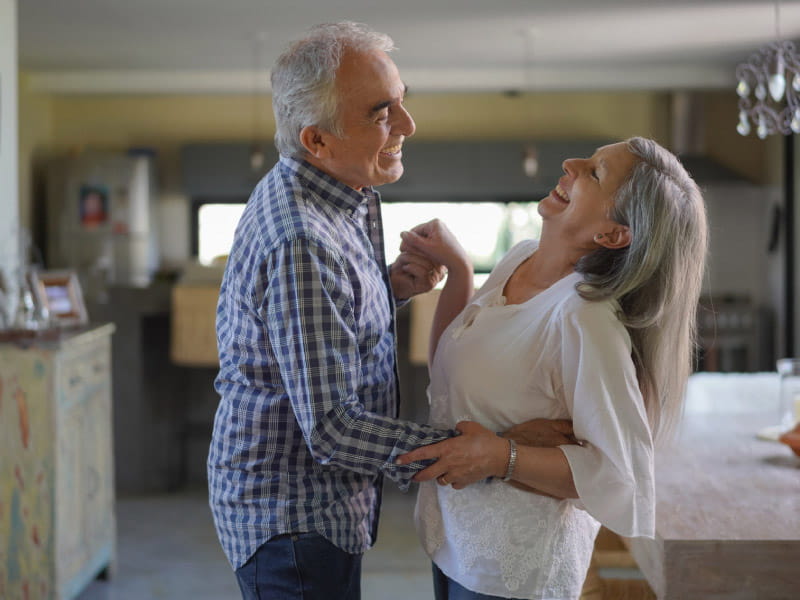How you feel about aging could affect health. Here’s how to keep the right attitude.

Is old age really just a state of mind?
Maybe not the number, but as we age. A growing body of research suggests that a person’s mindset – how they feel about getting older – can predict how long they have left to live and how well they will live over the years.
Several studies over the past 20 years suggest that people with a more positive view of aging live longer and healthier lives than those with a negative view of the aging process. Recently, a large nationwide study of nearly 14,000 adults over 50 took an even deeper look at how positive thinking about aging can affect a person’s physical health, health behaviors, and psychological well-being.
The study, published in the JAMA Network Open, found that those with the highest satisfaction with aging had a 43% lower risk of dying from any cause during the four-year follow-up than those with the lowest satisfaction. People with higher satisfaction also had a lower risk of chronic conditions like diabetes, stroke, cancer, and heart disease, as well as better cognitive function. People with more positive attitudes toward aging were also more likely to be physically active and less likely to have trouble sleeping than their less satisfied peers. They were also less lonely, less depressed, more optimistic, and had a stronger sense of purpose.
“There is a link between mindsets and health behaviors,” said Eric Kim, the study’s lead researcher and an assistant professor of psychology at the University of British Columbia in Vancouver, Canada. “One thing leads to another.”
For example, while older adults tend to be less likely to use preventive health services than younger or middle-aged groups, a study Kim co-authored in the journal Preventive Medicine shows that people over 50 are more satisfied with their age and are more likely to have their cholesterol tested or screened for breast, cervical, or prostate cancer.
But it cuts both ways. While a positive attitude can lead to behaviors that promote good health, “when people believe that ill health is inevitable with age, it can be a self-fulfilling prophecy that deters them from behaviors that promote aging.” said Kim, who is also an affiliate researcher at the Center for Health and Happiness at Harvard TH Chan School of Public Health in Boston.
“The good news is that these beliefs that we hold about aging are changeable. We can change the way we think,” said Hannah Giasson, who co-wrote the preventative medicine study with Kim and others. She is an Assistant Professor at Arizona State University’s Edson College of Nursing and Health Innovation in Phoenix, specializing in the relationship between people’s views of aging and their health and well-being.
Here are things that Kim and Giasson say can help people be more positive about aging.
Keep a sense of purpose
Some people aren’t sure what to do with themselves after they retire, Kim said. He suggests finding projects that align with a person’s values.
“People’s intentions can be very different,” he said. If family is a high priority, find things that contribute to the family, such as helping care for grandchildren. If conservation is an important value, find projects that contribute to the health of the environment.
“Volunteering is a great way to do that,” he said.
Recognizing – and rejecting – negative messages about aging
Research shows that negative stereotypes about aging are internalized over a person’s lifespan and can affect physical and cognitive health as a person ages.
“Become aware of these messages,” Giasson suggests. “Understand how they affect us.”
For example, a person may believe that poor physical health is inevitable for older adults, so trying to stay active makes no sense. However, according to the National Institute on Aging, exercise can reduce the risk of cardiovascular disease, high blood pressure and type 2 diabetes, improve sleep and reduce the risk of falls.
“Realize that practicing healthy behaviors can support health at any age,” Giasson said.
Stay socially active
As people age, they may lose loved ones such as spouses, family members, or friends. If a spouse was responsible for maintaining social networks and that person dies, the surviving spouse can become lonely and more socially isolated.
Social isolation and loneliness are risk factors for poor physical and mental health, increase the risk of heart attacks and strokes, and contribute to low life satisfaction, depression, low self-esteem, and difficulties with activities of daily living. However, research shows that maintaining social connections can have a positive impact on health.
Kim said it was important to make new connections to replace the lost ones.
“What usually happens is people stop making new friends. They resort back to mechanisms to meet people who were there earlier in life,” he said. such as joining a club or participating in community organizations. “Reach more people instead of going on autopilot.”
Try something new
Sometimes people lose mobility as they age and may not be able to engage in the activities they enjoyed when they were younger. Kim suggests trying to “use that energy in a new way,” such as teaching a skill or craft, rather than practicing it.
Or learn something new that’s less physically demanding, Giasson said. Research suggests that older adults who learn new skills can improve memory, self-esteem, and overall quality of life.
“Don’t get into the mindset that it’s too late to try something new,” she said. “It’s never too late and you’re never too old to discover new interests.”
If you have any questions or comments about this American Heart Association News story, please email [email protected].